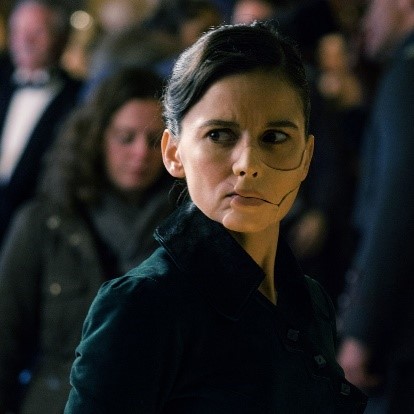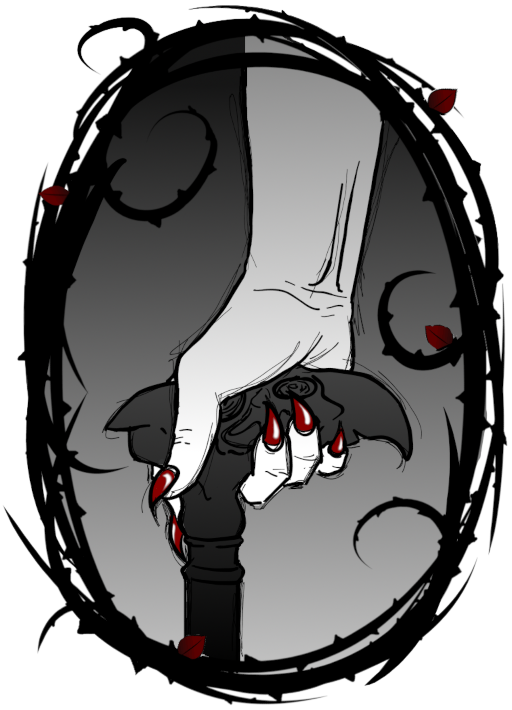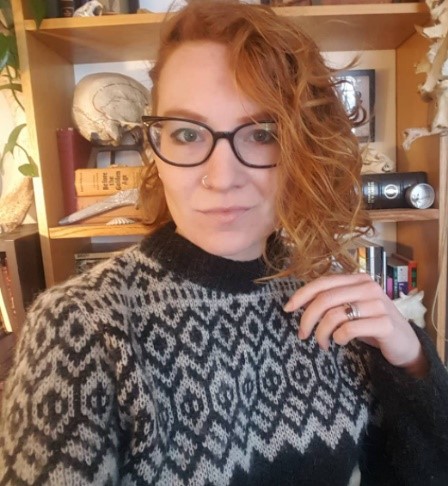For two years now, Sirens has published an ongoing series of essays that showcase the brilliance of our community—and give those considering attending a look at the sorts of topics, perspectives, and work that they are likely to encounter at Sirens. While we’ve postponed our in-person program to 2021, and we are gathering safely online this weekend, we wanted to take this opportunity to feature the exemplary work that the Sirens essayists have presented over the past two years. We hope that you find these works thoughtful, bold, and brilliant.

Moral Disability: How Villainy Looks When You’re the Monster
by by V. S. Holmes
If you prefer, we offer a video of V.S. reading this essay:
Our depiction of disfigurement and disability in villains—those in speculative works, particularly—taints our perception of disabled people in our own world with a dangerous morality. All of us know the ache of being unable to find yourself in a book and the annoyance when a character is just the lovechild of stereotypes and bigotry. So much of Sirens focuses on the importance and beauty in seeing ourselves—our strengths, our flaws, our lives—in speculative fiction. But when I search for a character like me, I find Captain Hook’s missing hand. I find Viren’s magical staff. I find villains.

We know the disabled villain trope well, from obvious monsters to the more human. Even works built on a platform of progressive ideals frequently fall short with ableism: Dr. Isabel Maru’s scars in the 2017 Wonder Woman film broke my heart (as did Steve Trevor’s cheap quip that Diana was blind). Sometimes it’s an offhand way to telegraph “This one’s the bad guy!” But when the character’s disability or disfigurement is part of their backstory, we often learn that their evil stems from the isolation and abuse they received because of their disability. Regardless of our fascination with darkness, if we look beyond the scarred, limping package of most classic villains, we see honest and understandable emotions.
Excluded, angry, desperate, misunderstood: We all have felt these at some juncture, and they are emotions disabled people carry with us every day. Frankly, they’re justified. So why are creators—including speculative creators—intent on making the disfigured and disabled evil?

Disability is feared because it is one of the few marginalizations that’s “catching.” As much as we want to believe we’re invincible, we aren’t. I’m often asked what happened to me when I use my cane or if I have a heart monitor strapped to me. Accidents happen. Genetics happen. I agree—finding out my body was unable to do what it used to was scary. Returning to the example of the Wonder Woman canon: Maru’s inception as a character was based on her terror that she might figuratively lose face, a fear turned literal in her modern film debut.
No one wants something traumatic and life-altering to happen to themselves or their families, even in a world as advanced as ours can be—have you seen the bionics from Hero Arm? Instead, we retreat to the rigid idea that people deserve what happens to them. Car accident leave you paralyzed? Maybe you shouldn’t have reached down to change the playlist. Connective tissue breaking down? Maybe you should have been better about taking those vitamins.
If the characters who limp, whose faces are scarred from birth or accident deserved it, then in turn, if you become disabled, you are also Bad.
The underbelly of these thoughts births horrific legislation and murder under the label of mercy. Husbands murder wives with dementia; parents murder children with development disabilities. These tragedies are termed “acts of love” when really it’s just fear and annoyance at a perceived burden.
The pervasive fear of illness and disfigurement in our world is seen so much more now as illness arrives on our doorsteps. Many think that, just by doing the right thing, they’ll be spared. As long as I follow the rules, I’ll be OK. As long as everyone likes me, I’ll be fine. As long as I do my yoga and take my vitamins and wear my mask, I won’t fall ill because, after all, I’m Good. Right? RIGHT?
It doesn’t work that way.
When we encounter disabled antagonists who have a redemption arc, the resolution is a magical cure—rewarded for being Good or Brave or Selfless and Doing the Thing. Suddenly they’re no longer blind, or their limb is restored, or the anxiety stops its incessant yammering. By this logic, disabled people must be Bad, because surely if we were Good, we would be cured by now.

A good subversion of this was Katarra offering to heal Zuko’s burn scar in Avatar: The Last Airbender. The action is a classic symbol of his redemption, that he is accepted and loved by his new community, so now he can be Whole. However, the healing is interrupted and Zuko lives the rest of his life scarred—the rest of his fulfilling, long, and happy life, may I add.
This morality in our world is often mirrored in SFF worlds to show how terrible the world is, to show how tragic the history of war and magic and creatures has been. Where we do see disability addressed it is often on wealthy core planets that offer access to incredible therapies and technology or magic that all but erases our disability as nothing more than a fun worldbuilding quirk. Like in our own world, these treatments are gatekept by wealth. Additionally, we see this in heroes whose disability is the price for power, making it clear that no matter the world, being disabled is a negative.
Writing with this framework—which, like any privilege, isn’t easy to see and hard to disassemble—makes it tempting to cure the suffering and sickness in our speculative works.
In magical kingdoms and high-tech space stations, it’s easy to cleanse our world of hardship. Of scars. Of sickness.
I don’t want to be Clorox-wiped from the countertop or relegated to the corners as humans love to do with monsters. Disability cannot be erased. Many fall back on the reasoning that writing diverse characters isn’t realistic, but at Sirens we know that “reality” is based on a misunderstood, sanitized, and white-washed account of history—besides, what about the dragons? The realism argument does not hold up with disability, either. Gene therapy doesn’t prevent physical accidents. Nanobots and magical cures can’t stop evolution from testing countless new mutations—life will find a way, right? And honestly, not all disabled or disfigured people want a cure. In our world, seeking cures is often rooted less in our comfort than in freeing abled people of the “effort” of accommodating us.
Disability arcs grow complicated when we turn back to the villain’s past. There is no denying that enduring terrible things changes the way we view our world and the other people in it. Disability complicates our relationships with our bodies, our minds, and our entire sense of self. I’m in pain most days. It makes me short-tempered at the best of times. So, should I smile and make a go at world domination? I have my bad days like anyone else, but fascism seems a bit far.
Luckily for all of us readers and writers, cures are unnecessary with magical and advanced accessibility: A character doesn’t need to be able to walk without pain, because their hover chair can go anywhere on and off the electro-mag grid. Accessibility adds an incredible layer of worldbuilding from which to draw inspiration—both for worlds we can visit in our imaginations and those we can build from our own.
Plus, if you’re looking for a “wow” factor, changing a society’s perception is a way bigger miracle than just changing one person’s pesky meat-suit!
At its core, fantasy is about imagination, about pushing the boundaries of society and humanity on page and on screen. When building these worlds, it is easier to look backward at where we’ve been—and not just for our obstacles, but for our ideals. In small ways, we’re dismantling this framework: In 2018, the British Film Institute announced that they were banning disfigured villains to “remove the stigma,” though I’ve seen little mention of it since. If nothing else perhaps we’ll avoid a few poorly written origin stories that no one asked for, right?
I’d much rather imagine an accessible world where we can attend our places of worship, fan conventions, and job interviews. One where we don’t endure the embarrassment of being carried upstairs when there’s no lift. A world where someone will meet our eyes and we know they are looking at us, not the scar on our face, or the unique proportions of our body.
Casting a morality judgment on who becomes disabled or disfigured inherently changes the way disabled people navigate our world, often at the highest cost. Whether we are creatives or readers or activists, the worlds we imagine shape our perception of our own, and its people. Let’s envision a world not where people like me don’t exist, but where it’s easier for us to.
 V. S. Holmes is an international bestselling author. They created the Reforged series and the Nel Bently Books. Smoke and Rain, the first book in their fantasy quartet, won New Apple Literary’s Excellence in Independent Publishing Award in 2015. In addition, they have published short fiction in several anthologies. When not writing, they work as a contract archaeologist throughout the northeastern U.S. They live in a Tiny House with their spouse, a fellow archaeologist, their not-so-tiny dog, and own too many books for such a small abode. As a disabled and queer human, they work as an advocate and educator for representation in SFF worlds. For more information about V, please visit their website or their Twitter.
V. S. Holmes is an international bestselling author. They created the Reforged series and the Nel Bently Books. Smoke and Rain, the first book in their fantasy quartet, won New Apple Literary’s Excellence in Independent Publishing Award in 2015. In addition, they have published short fiction in several anthologies. When not writing, they work as a contract archaeologist throughout the northeastern U.S. They live in a Tiny House with their spouse, a fellow archaeologist, their not-so-tiny dog, and own too many books for such a small abode. As a disabled and queer human, they work as an advocate and educator for representation in SFF worlds. For more information about V, please visit their website or their Twitter.







Connect with the Sirens community
Sign up for the Sirens newsletter